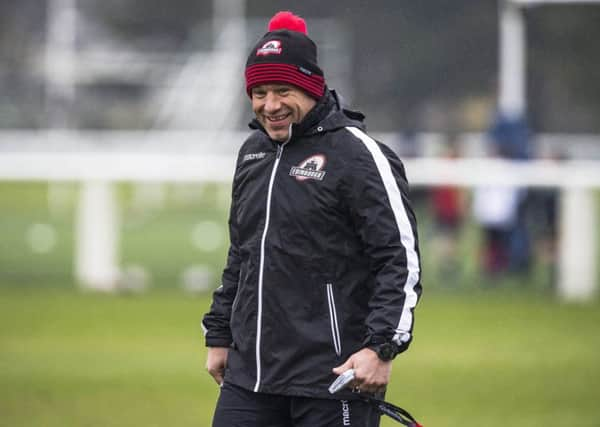Edinburgh target capital gains for new season


How did Richard Cockerill succeed when so many others had failed? He addressed the big picture but did not ignore the detail. First up, the work ethic, or lack of it, had to be addressed. This was the big one. We had written on numerous occasions that Edinburgh were just playing at professional rugby, and Cockerill agreed as his new captain Stuart McInally revealed.
“We had a good meeting up in St Andrews [earlier this month]. We said why we thought we’d performed well last year and that was because we’d definitely worked harder,” McInally noted.
Advertisement
Hide AdAdvertisement
Hide Ad“He [Cockerill] is pretty straight up. You come in, you work hard and you get results. That’s what he’s built his whole career around, as a player and as a coach, and he’s had a lot of success.”
Why it required a new coach to see what was obvious to squint-eyed members of the press corps is anyone’s guess, but as McInally, again, pointed out, the players were probably too close to the trees to be able to see the wood.
“I think it’s all we’d known,” said the hooker. “We’d been put in a set-up where we probably thought we were working hard because the programme was what it was and we were working as hard as we could. But the players can’t say, ‘Let’s all come in on a Sunday’. That has to come from the top.
“So it’s just having someone come in from the outside who says, ‘Right, these guys are working hard but they are just not doing enough’. I think maybe that is what we needed. We all worked hard but it’s just what that actually looked like, you just raise that to another level and all our fitness scores and everything is through the roof just because we are being pushed harder.”
It begs the question as to why previous coaches didn’t ask for Glasgow’s fitness scores to compare and contrast with Edinburgh’s old numbers, but these things always look obvious afterwards.
In addition to the big issue of the club’s work culture, McInally said that Cockerill also addressed the small stuff, immediately hiring a throwing coach, especially important for a reconstituted breakaway like himself.
“I didn’t really understand the need for a throwing coach until last year probably,” admitted McInally. “I was like… I can take a bag of balls and I can throw. That is all he is going to do anyway but he’s actually come in and he’s so technical. He films you, and after every training session I get a big list of throws.”
Throwing coach Simon Hardy helped England win the 2003 World Cup but he recently ended a 22-year association with his country of birth to work as an independent consultant with various clubs, including Edinburgh.
Advertisement
Hide AdAdvertisement
Hide Ad“Things like ‘the ball’s not flying right’, he’ll say ‘Well, you do this’ and it’s fixed,” says McInally, with a sense of wonder. “Stuff like that is invaluable, things that I’d never thought of myself and I’d maybe spent months changing hand positions or anything but he just comes along and says ‘do this’. That’s just one example of how good it is.”
Get the big stuff right, on work ethic, collect the marginal gains where you can, and the team was never going to do anything but improve. The question is how you back that up the following season when further advances are, by necessity, going to be hard yakka?
The defence is much improved under the baleful eye of Calum MacRae, with Edinburgh conceding just 375 points during the regular season, only one worse than Leinster.
So the spotlight inevitably falls upon the offence, where Edinburgh’s 62-try tally was respectable but a whopping 21 behind the Dublin table-toppers.
“I would like to see us keep developing our attack,” said McInally when asked what Edinburgh have to do next. “I think we have some very exciting backs who score a lot of good tries, and someone like Blair Kinghorn is one of the hottest prospects in the league at the moment and is someone we want to get on the ball as much as possible.
“I think that [improvements in attack] is one thing that will happen, we have been working hard on it in pre-season and hopefully it’s a big part of this league, everyone likes to attack, and hopefully we can get some of our exciting youngsters on the ball.”
Edinburgh do have some exciting young backs but arguably not quite enough of them, or so Cockerill suggests. He freely admitted that his back three, with the possible exception of Kinghorn and Duhan van der Merwe, were a little lacking in star quality. The half-back pairing of Henry Pyrgos and Simon Hickey has to bed in quickly and, while the midfield boasts Matt Scott and Mark Bennett, there is almost no one keeping them honest unless James Johnstone and/or Chris Dean raise their ante.
Duncan Hodge has a difficult task which will be exacerbated should key players fall to injury. Much will rest upon the ability of Hickey to organise and invigorate his back line but Edinburgh also have to work hard not to become predictable, which is easily done when the strength of the side lies in those muscular forwards. Edinburgh rolled up their sleeves last season and got their reward but their stand-out achievement wasn’t making the play-offs, which happened because Ulster imploded. Instead Edinburgh’s high water mark came at Christmas when they beat Glasgow with 14 men. They won that match by one point, and another two games by the same margin.
Edinburgh could make the play-offs again come May but, with Ulster resurgent, they will need to improve… again.